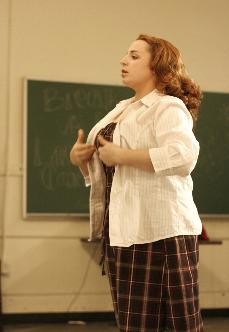This fall, Loyola will join numerous groups and schools that have performed “The Laramie Project” since its premiere in 2000.
It’s been nine years since Matthew Shepard’s brutal killing, but it’s forever remembered through “The Laramie Project,” a play written by Moises Kaufman and members of the Tectonic Theater Project.
Shepard was at a bar in Laramie, Wyo., when he met Russell Henderson and Aaron McKinney. The two men drove Shepard through deserted countryside and pulled over, dragging him from the car. He was robbed, hit repeatedly in the head with a gun, tied to a fence and left to die. He was brutalized because he was gay, according to the police and residents of Laramie.
A cyclist discovered Shepard several hours later, who said at first he “thought Shepard was a scarecrow.”
Shepard was in intensive care with inoperable fractures to his head and several lacerations along his face and neck. He was on life support for four days and died Oct. 12, 1998.
After the intense media coverage surrounding Shepard’s death, Kaufman and members of the Tectonic Theater Project sought to tell the story in a different way. They made several trips to Laramie to further investigate the case and interview the residents of the small city. After compiling more than 200 interviews, the three-act play took shape. Eight actors portray more than 80 distinct characters in a series of short scenes. Even nine years after Shepard’s attack, many still remember his death as a catalyst for change.
The play premiered at The Ricketson Theatre and was put on by the Denver Center Theatre Company in February 2000 and has since been turned into movies and performed by countless theater groups and schools.
Directing the eight young actors at Loyola is C. Patrick Gendusa, visiting assistant theater professor. He instructed the players to educate themselves about hate crimes by interviewing both students and teachers about Shepard’s death.
Mass communication junior Caitlin Clifford, one of the actors, asked Robert Thomas, interim director of the School of Mass Communication, if he thought there may be a way to educate and prevent hate crimes or to find a solution for them.
“I think we should be (trying to educate people) everyday,” he said. “But do I think (hate crimes) will ever go away? No.”
English writing freshman Jonas Griffin said the play “called” to him.
“I just love what the play is about and wanted to get involved with something so profound,” he said.
“Coming into this, I was already a strong supporter of gay rights – human rights in general – and this show just strengthens it,” said theater arts freshman Priscilla Jenkins. “It gave me one more reason to believe that we should all be treated the same.”
The actors said the interviews didn’t always go smoothly.
“It was intense, very intense,” said psychology and theatre arts sophomore Tracey Cochran. “I was really struck by the response I received by some people – just the common idea that people had that still wasn’t right. I heard these good people saying things that weren’t very good, but they are good people. And when I actually transcribed the interviews, I was in tears.”
With these short weeks working on “The Laramie Project,” they became more than just a cast and much more than just friends – they became “a family,” according to Gendusa.
“They are like my children, and seeing them on stage is like watching your child do something great,” he said.
The cast performed “The Laramie Project” Nov. 2, 3 and 4, and they will also perform on Nov. 10 and 11 at Marquette Theatre.
Gabriela Rivera can be reached at gcrivera@loyno.edu.






